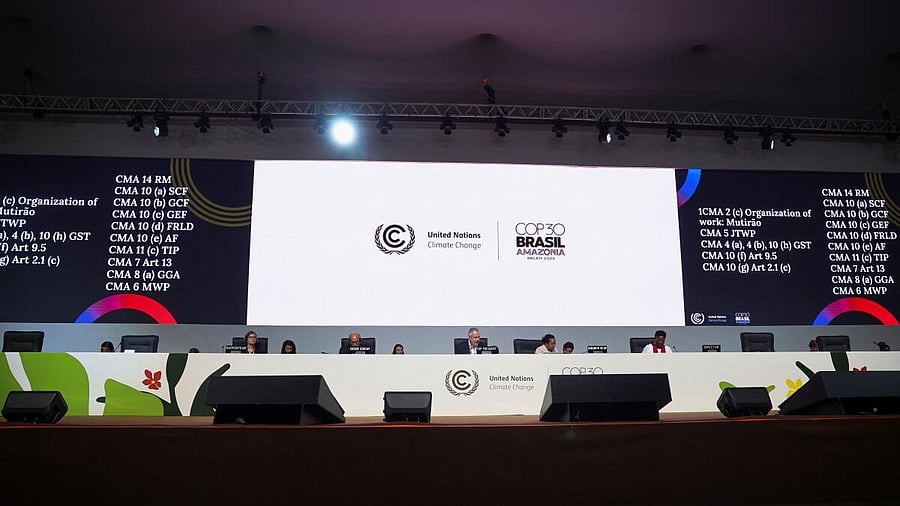
COP30 President Andre Correa do Lago presides over the plenary session at the UN Climate Change Conference (COP30), in Belem, Brazil.
Credit: Reuters Photo
Ten years after the Paris Agreement, and a year after the magnificent mess in Baku, the United Nations’s annual climate jamboree of unkept promises convened for its 30th edition in the city of Belém, situated on the ancestral land of the Tupinambá and Pacajás peoples, on the banks of the Amazon River at the edge of a forest soon to be scarred by unprecedented drilling for oil and gas, and the relentless expansion of agribusiness.
Billed as the ‘COP of Implementation’, COP30 opened on November 12, amid great hype, only to descend swiftly from optimism into chaos. Despite the presidency’s frantic ‘shuttle diplomacy’ to secure an ambitious outcome anchored in Mutirão, the spirit of collective effort and solidarity, the talks unravelled by the second week, and ended two days later than scheduled, with high drama and dangerously low ambition.
The stage was set for success. The conference was led by the seasoned diplomat Ambassador André Corrêa do Lago as COP president, veteran NGO activist Ana Toni as CEO, and even the PR giant Edelman, hired to build spin with punchy Portuguese taglines like Cúpula dos Povos (summit of the people). Brazil’s President Luiz Inácio Lula da Silva’s opening speech, calling for a “COP of Truth,” raised further expectations.
For a ‘COP of Implementation’, the main items in the agenda naturally were provisions of finance for mitigation, adaptation, and loss and damage — the unfinished business from Baku. The centrepiece was the $300 billion climate finance goal called the New Collective Quantified Goal (NCQG). Alongside it were the lingering fossil fuel phase-down/phase-out plans from Dubai, pending collection of adaptation finance from Glasgow, and agreeing on indicators for the global goal on adaptation (GGA).
Civil society was calling for a Just Transition Mechanism, the Belem Action Mechanism, to give just transition a home in the UNFCCC, and offer pathways to accelerate climate action with equity and justice between and within countries. Hovering over it all was the Paris Agreement’s 1.5°C ambition, temporarily breached this year but, according to an ever-optimistic UN Secretary-General António Guterres, just waiting to be bent back into shape by “aggressive climate action”.
With the United States notably absent from the negotiating rooms and, thus, unable to stall progress with its characteristic bluff and bluster, the world looked for a new climate champion to share the spotlight with Lula. Despite a buzz of hopeful Indian commentary, Prime Minister Narendra Modi skipped the high-level segment entirely. Environment Minister Bhupendra Yadav arrived only in the second week, empty-handed, without the long-awaited announcement of India’s new Nationally Determined Contributions (NDCs).
Ostensibly, because the promised billions remain as elusive as ever for communities already living with the brutal reality of climate change. In the chants by scores of indigenous peoples protesting inside and outside the Hangar Convention Centre, you heard a consistent truth — one that India and other developing nations keep repeating. The money rarely arrives as real support; instead, it comes as high-cost loans and commercial deals inaccessible to local communities, even as climate change-induced disasters hit them relentlessly.
“We need grants, we need fairness, and we need honesty in climate finance,” India declared on behalf of the Like-Minded Developing Countries (LMDCs). For the developing world, India insisted, adaptation finance is not an ‘optional add-on’ but an ‘essential investment’. “It will take nothing less than a global collective effort to increase climate finance to the levels articulated in the Baku to Belem Roadmap to $1.3 trillion,” Yadav added.
Meanwhile, in a final bid, a group of countries led by Colombia, the European Union, the United Kingdom, and 80 other countries, tried to whip up support for a roadmap to transition away from fossil fuels (TAFF). The idea promptly hit a brick wall called the Arab Group, along with Russia, Bolivia, and a few African nations, provoking a dangerous schism. For most emerging economies like India, without serious financial commitments from the developed world, all the lofty talk of a fossil fuel phase-out and bending the temperature curve seemed as futile as promising to fix the climate by the strike of the closing gavel.
The final text called the ‘Global Mutirão: Uniting humanity in a global mobilisation against climate change’, did not have any reference to fossil fuel phase out, was weak on any climate finance commitments, riddled with poorly revised and unmeasurable indicators for the GGA, an overall lack of ambition to bridge the widening gap between what needs to be done, and where we are at with ambition to at any on 1.5 c.
But Belém was not Baku. When Do Lago tried to gavel the package through with his political blinkers firmly on, delegates refused to play extras in a scripted finale. One after another, countries took the floor to record their rejection of the adaptation indicators, their discomfort with a hollowed‑out mitigation work programme, and their anger at a decision‑making process that treated them as an audience, not involved parties. The rebellion forced the presidency to suspend the plenary.
When it reconvened, the script had changed only slightly, but the cast around Do Lago had grown: Russia, India, the LMDCs, and others lined up to back the text in the name of saving a bruised but still breathing multilateral process.
COP30 limped out of Belém with more questions than answers, especially on how to fix a system where the most affected people get the least say and the least support.
Ten years after Paris, Belém did not kill the promise of climate justice. It simply showed, once again, who is still paying in advance and who is still paying lip service.
Shailendra Yashwant is a senior advisor with Climate Action Network South Asia, and participated in COP 30 in Belem as an observer.
Disclaimer: The views expressed above are the author's own. They do not necessarily reflect the views of DH.